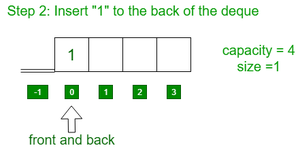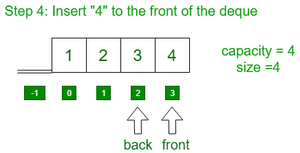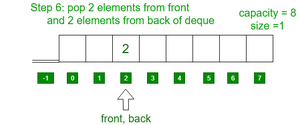任务是使用模板类和循环数组实现动态 Deque,具有以下功能:
- front():从双端队列中获取最前面的项目。
- back():从双端队列中获取最后一项。
- push_back(X):在双端队列末尾推送 X。
- push_front(X):在双端队列开始时推送 X。
- pop_front():从双端队列的开头删除一个元素。
- pop_back():从双端队列的末尾删除一个元素
- empty():检查双端队列是否为空
- capacity():当前 deque 可以存储的最大元素数
- size():双端队列中的元素数
下面是分步说明:
- 最初,双端队列是空的

- 将 1 插入到 deque 的后面

- 将元素 2、3 插入到 deque 的后面

- 在 deque 前面插入 4

- 将 5 插入到 deque 的后面

- 从 deque 前面弹出 2 个元素,从 deque 后面弹出 2 个元素

- 从 deque 前面弹出 1 个元素

方法:这个想法是在每次数组容量已满时将使用的数组大小加倍,并将前一个数组的元素复制到新数组中。请按照以下步骤解决问题:
- 初始化 4 个变量,比如frontIndex 、 backIndex 、 sizeVar和capacityVar ,以及一个数组比如arr[]来实现双端队列。
- 定义一个函数say capacity()来查找当前使用的数组的大小并返回变量capacityVar的值。
- 定义一个函数say size()来查找双端队列中元素的数量并返回变量sizeVar的值。
- 定义一个函数说满()找到,如果双端队列是否已满,如果sizeVar等于capacityVar返回true。否则,返回false。
- 定义一个函数say empty()来查找双端队列是否为空,如果frontIndex和backIndex等于-1则返回 true。否则,返回false。
- 定义一个函数say Front()来打印双端队列的前端元素。如果 deque 不是 empty(),则打印arr[frontIndex]的元素。
- 定义一个函数say Back()来打印双端队列的最后一个元素。如果 deque 不是 empty() ,则打印arr[BackIndex]的元素。
- 定义一个函数say push_back(X)在双端队列的末尾插入一个元素:
- 如果双端队列已满,则将当前数组的大小加倍,并将前一个数组的元素复制到新数组中。
- 如果 deque 为empty() ,则分配frontIndex = backIndex = 0 ,然后将X分配给arr[frontIndex]和arr[backIndex] ,然后将sizeVar增加 1。
- 否则,更新backIndex如backIndex =(backIndex + 1)%capacityVar然后分配X由一个常用3 [backIndex]和增量sizeVar。
- 定义一个函数say push_front(X)在双端队列的开头插入一个元素:
- 如果双端队列已满,则将当前数组的大小加倍,并将前一个数组的元素复制到新数组中。
- 如果 deque 为empty() ,则分配frontIndex = backIndex = 0 ,然后将X分配给arr[frontIndex]和arr[backIndex] ,然后将sizeVar增加 1。
- 否则,更新frontIndex如frontIndex =(frontIndex-1 + capacityVar)%capacityVar然后分配X由一个常用3 [frontIndex]和增量sizeVar。
- 定义一个函数say pop_front()来删除 deque 前面的一个元素:
- 如果双端队列为空,则打印“Underflow” 。
- 否则,如果是sizeVar通过一个等于1,则分配-1至frontIndex和backIndex两者结合,然后递减sizeVar。
- 否则,更新frontIndex如frontIndex =(frontIndex + 1)%capacityVar和减量sizeVar由一个。
- 定义一个函数say pop_back()来删除 deque 前面的一个元素:
- 如果双端队列为空,则打印“Underflow” 。
- 否则,如果是sizeVar通过一个等于1,则分配-1至frontIndex和backIndex两者结合,然后递减sizeVar。
- 否则,更新backIndex如backIndex =(backndex-1 + capacityVar)%capacityVar和减量sizeVar由一个。
下面是上述方法的实现:
C++
// C++ program for the above approach
#include
using namespace std;
// Class definition of the deque
template
class Deque {
private:
// Stores the frontIndex
int frontIndex;
// Stores the backIndex
int backIndex;
// Stores the array
X* arr;
// Stores the size of deque
int sizeVar;
// Stores the size of array
int capacityVar = 4;
public:
// Deque class constructor
Deque()
{
arr = new X[capacityVar];
frontIndex = backIndex = -1;
sizeVar = 0;
}
// Function methods
bool empty();
bool full();
void push_back(X x);
void push_front(X x);
void pop_front();
void pop_back();
X front();
X back();
int capacity();
int size();
};
// Function to find the capacity of the deque
template
int Deque::capacity()
{
return capacityVar;
}
// Function to find the number of elements
// present in deque
template
int Deque::size() { return sizeVar; }
// Function to check if deque is empty or not
template
bool Deque::empty()
{
if (frontIndex == -1 && backIndex == -1)
return true;
else
return false;
}
// Function to check if deque is full or not
template
bool Deque::full()
{
if (sizeVar == capacityVar)
return true;
else
return false;
}
// Function to find the front element of the deque
template
X Deque::front()
{
// If deque is empty
if (empty()) {
cout << "Deque underflow" << endl;
abort();
}
return arr[frontIndex];
}
// Function to find the last element of the deque
template
X Deque::back()
{
// If deque is empty
if (empty()) {
cout << "Deque underflow" << endl;
abort();
}
return arr[backIndex];
}
// Function to insert the element
// to the back of the deque
template
void Deque::push_back(X x)
{
if (full()) {
// If the deque is full, then
// double the capacity
capacityVar = capacityVar * 2;
// Initialize new array of
// double size
X* temp = new X[capacityVar];
// Copy the elements of the
// previous array
int i = frontIndex;
int j = 0;
while (i != backIndex) {
temp[j] = arr[i];
i = (i + 1) % sizeVar;
j++;
}
temp[j] = arr[i];
frontIndex = 0;
backIndex = sizeVar - 1;
// Deallocate the memory
// of previous array
delete[] arr;
arr = temp;
}
// If size is zero
if (empty()) {
frontIndex = backIndex = 0;
arr[backIndex] = x;
sizeVar++;
return;
}
// Increment back index cyclically
backIndex = (backIndex + 1) % capacityVar;
arr[backIndex] = x;
sizeVar++;
return;
}
// Function to insert the element
// to the front of the deque
template
void Deque::push_front(X x)
{
if (full()) {
// If the deque is full, then
// double the capacity
capacityVar = capacityVar * 2;
// Initialize new array of
// double size
X* temp = new X[capacityVar];
// Copy the elements of the
// previous array
int i = frontIndex;
int j = 0;
while (i != backIndex) {
temp[j] = arr[i];
i = (i + 1) % sizeVar;
j++;
}
temp[j] = arr[i];
frontIndex = 0;
backIndex = sizeVar - 1;
// Deallocate the memory
// of previous array
delete[] arr;
arr = temp;
}
// If size is zero
if (empty()) {
frontIndex = backIndex = 0;
arr[backIndex] = x;
sizeVar++;
return;
}
// Decrement front index cyclically
frontIndex
= (frontIndex - 1 + capacityVar) % capacityVar;
arr[frontIndex] = x;
sizeVar++;
return;
}
// Function to delete the element
// from the front of the deque
template
void Deque::pop_front()
{
// If deque is empty
if (empty()) {
cout << "Deque underflow" << endl;
abort();
}
// If there is only one character
if (frontIndex == backIndex) {
// Mark deque as empty
// and decrement sizeVar
frontIndex = backIndex = -1;
sizeVar--;
return;
}
// Increment frontIndex cyclically
frontIndex = (frontIndex + 1) % capacityVar;
sizeVar--;
return;
}
// Function to delete the element
// from the back of the deque
template
void Deque::pop_back()
{
// If deque is empty
if (empty()) {
cout << "Deque underflow" << endl;
abort();
}
// If there is only one character
if (frontIndex == backIndex) {
// Mark deque as empty
// and decrement sizeVar
frontIndex = backIndex = -1;
sizeVar--;
return;
}
// Decrement backIndex cyclically
backIndex = (backIndex - 1 + capacityVar) % capacityVar;
sizeVar--;
return;
}
// Driver Code
int main()
{
// Deque initialization
Deque q;
// Iterate range [1, 100],
// push even numbers at the back
// and push odd numbers at the front
for (int i = 1; i < 10; i++)
if (i % 2 == 0)
q.push_back(i);
else
q.push_front(i);
// Print the current capacity
cout << "Current capacity " << q.capacity() << endl;
// Print the current size
cout << "Current size " << q.size() << endl;
// Print front elements of deque
cout << "Front element " << q.front() << endl;
// Print last element of the deque
cout << "Rear element " << q.back() << endl;
cout << endl;
cout << "Pop an element from front" << endl;
// Pop an element from the front of deque
q.pop_front();
cout << "Pop an element from back" << endl;
// Pop an element from the back of deque
q.pop_back();
cout << endl;
// Print the current capacity
cout << "Current capacity " << q.capacity() << endl;
// Print current size
cout << "Current size " << q.size() << endl;
// Print front elements of deque
cout << "Front element " << q.front() << endl;
// Print last element of the deque
cout << "Rear element " << q.back() << endl;
return 0;
} 输出
Current capacity 16
Current size 9
Front element 9
Rear element 8
Pop an element from front
Pop an element from back
Current capacity 16
Current size 7
Front element 7
Rear element 6时间复杂度: O(N)
辅助空间: O(N)
如果您想与行业专家一起参加直播课程,请参阅Geeks Classes Live